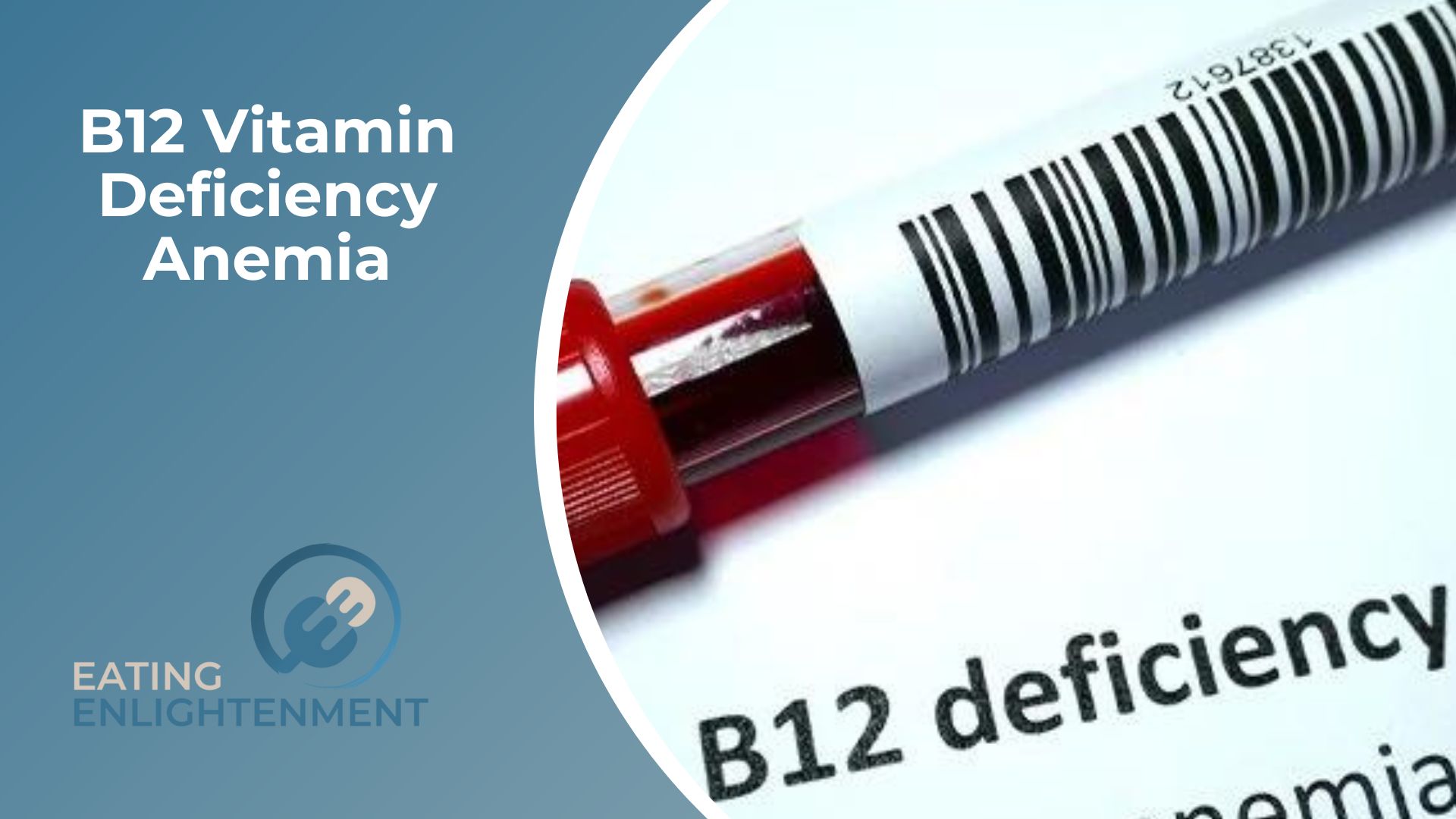If you are feeling tired and run down, you may want to get your B12 levels checked.
B12 vitamin deficiency anemia is a common condition that can cause a wide range of symptoms.
If left untreated, it can lead to serious health problems such as dry, chapped lips, nerve damage and memory loss.
In this blog post, we will discuss the causes, symptoms and treatment of B12 vitamin deficiency anemia.
We will also answer some frequently asked questions about this condition. So if you are interested in learning more, keep reading!
What is B12?

B12 is a water soluble vitamin that is found in animal products such as meat, poultry, fish, eggs and dairy products.
It is also available in supplements and some fortified foods such as cereals and soy milk.
B12 plays an important role in the production of red blood cells and the maintenance of the nervous system.
What is vitamin B12 deficiency anemia?
Vitamin B12 deficiency anemia is a condition in which the body does not have enough healthy red blood cells.
Red blood cells are responsible for carrying oxygen to the body’s tissues. When there is a B12 deficiency, the body cannot produce enough of these cells.
This can lead to a wide range of symptoms, including fatigue, weakness, shortness of breath and more. Which we’ll discover later in this blog post.
What happens when your vitamin B12 is low?

If you have a vitamin B12 deficiency, it means that your body does not have enough of this nutrient. Vitamin B12 is important for making red blood cells, which carry oxygen to all the parts of your body.
Without enough vitamin B12, your body cannot make enough healthy red blood cells. This can lead to a condition called anemia. Anemia can cause fatigue, shortness of breath, and other symptoms.
A severe vitamin B12 deficiency can also lead to neurological problems, such as problems with balance, memory, and vision. In severe cases, it can even lead to paralysis and death.
If you are pregnant and have a vitamin B12 deficiency, you may also experience pregnancy complications, such as premature birth or a low birth weight baby.
If you check out this dentist in Lafayette now, they’ll also inform you of the importance of vitamin B12 to your dental and oral health. Low levels of vitamin B12 can cause glossitis, cheilitis, and periodontitis.
When to see your doctor
If you’re feeling very tired, have a poor appetite and your skin and nails are looking pale, it’s a good idea to speak to your doctor. They may recommend some blood tests.
Your doctor can prescribe supplements that contain vitamin B12 or folate if you’re deficient in either of these vitamins. You’ll usually need to take these for several months to allow your body to build up its stores of these vitamins.
You’ll also need to eat foods that are rich in vitamin B12 or folate, or take a daily supplement that contains both of these vitamins.
Your doctor can refer you to a dietitian for advice on eating a healthy diet.
Causes of vitamin B12 or folate deficiency anemia
A lack of vitamin B12 or folate can cause anemia. Vitamin B12 and folate are found in many foods, but some people may not get enough of these vitamins from their diet.
Certain groups of people are more likely to develop vitamin B12 or folate deficiency anemia, including:
- pregnant women
- people with coeliac disease or Crohn’s disease
- people who have had surgery to remove part of their stomach (gastrectomy)
- vegans and vegetarians
- older people
People with certain medical conditions, such as pernicious anemia, can also develop vitamin B12 deficiency anemia. You may want to read B12 Vitamin Deficiency Causes: What is it?
Complications of vitamin B12 or folate deficiency anemia
If vitamin B12 or folate deficiency anemia isn’t treated, it can lead to serious health problems.
These include:
- neurological complications, such as problems with balance, memory and vision
- psychological problems, such as depression and psychosis
- cardiovascular complications, such as heart failure
If you’re pregnant and have vitamin B12 or folate deficiency anemia, it can lead to your baby being born prematurely (before 37 weeks of pregnancy) or having a low birth weight.
Symptoms of vitamin B12 or folate deficiency anemia
The symptoms of vitamin B12 or folate deficiency anemia can develop slowly, over a period of weeks or months.
You may not have any symptoms in the early stages of the condition.
Tiredness and lack of energy are often the first symptom of anemia.
Other symptoms can include:
- a pale complexion
- shortness of breath
- a fast heartbeat (tachycardia)
- dizziness or lightheadedness
- a yellowing of the skin (jaundice)
- a sore tongue or mouth ulcers
- muscle weakness
- disturbed vision
- psychological problems, such as depression, anxiety and memory problems
Diagnosing vitamin B12 or folate deficiency anemia
If your doctor thinks you may have anemia, they’ll ask about your symptoms and medical history.
They may also carry out a physical examination to look for signs of anemia, such as a fast heartbeat or pale skin.
Your doctor will then arrange for some blood tests to be done as discussed above. These will usually include a full blood count and tests to check your levels of vitamin B12 and folate.
If your doctor suspects you have pernicious anemia, they may refer you to a specialist for further tests and treatment.
What type of anemia is caused by insufficient vitamin B12?
Vitamin B12 deficiency anemia is a type of anemia that occurs when your body does not have enough vitamin B12.
It is a nutrient found in food, and it helps your body make red blood cells. Red blood cells carry oxygen to all the parts of your body.
If you don’t have enough vitamin B12, your body cannot make enough healthy red blood cells. This can lead to a condition called anemia.
Anemia can cause fatigue, shortness of breath, and other symptoms.
Vitamin B12 deficiency anemia is treated by getting more vitamin B12 into your body. This can be done through diet, supplements, or injections.
Once you start treatment, your symptoms should improve.
What is the most common cause of B12 deficiency?
The most common cause of vitamin B12 deficiency is a lack of dietary intake.
This can be due to following a vegan or vegetarian diet, or due to other reasons such as an eating disorder.
Other causes include poor absorption of vitamin B12 from the gut, and certain medical conditions that affect the gut or the ability of the body to absorb vitamin B12.
How is B12 deficiency anemia treated?
Vitamin B12 deficiency anemia is treated by getting more vitamin B12 into your body. This can be done through diet, supplements, or injections. Once you start treatment, your symptoms should improve.
If you have a severe vitamin B12 deficiency, you may need to receive vitamin B12 injections for the rest of your life.
However, most people with a milder form of the condition can be treated with oral supplements. Good dietary sources of vitamin B12 include meat, fish, poultry, eggs, and dairy products.
If you are vegan or vegetarian, you may need to take a vitamin B12 supplement. You can also get vitamin B12 from fortified foods, such as some breakfast cereals, soy products, and nut milks.
Summary
Vitamin B12 deficiency anemia is a type of anemia that occurs when your body does not have enough vitamin B12.
It is a nutrient found in food, and it helps your body make red blood cells. Red blood cells carry oxygen to all the parts of your body.
If you don’t have enough vitamin B12, your body cannot make enough healthy red blood cells. This can lead to a condition called anemia.
Anemia can cause fatigue, shortness of breath, and other symptoms.Vitamin B12 deficiency anemia is treated by getting more vitamin B12 into your body.
This can be done through diet, supplements, or injections. Once you start treatment, your symptoms should improve.
If you’re a beginner to supplements you may want to read our Supplements and Vitamins – Ultimate Beginner’s Guide.



